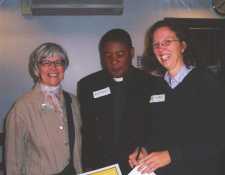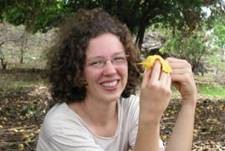Meeting Report
[Many thanks to Christabel Ames-Lewis for this report]
All life is risky in Mozambique, we heard from Rebecca Vander Meulen, who spoke in May to parish reps for our London link with Mozambique and Angola. Working as HIV/Aids co-ordinator for the diocese of Niassa in the north of the country (an area larger than the UK), Rebecca has found that the route to secure a change in attitude to HIV/AIDS and to deal with it effectively, and long-term, is through the community.

Equipas da VIDA - Life Teams, so named in preference to the more predictable Equipas da SIDA - AIDS Teams, raised and trained in the community, are the key. It is they which can gain people’s trust in a country where the experience of the civil war, though now a memory, still shapes attitudes to the world and affects responses to life’s challenges.
Since Rebecca arrived in Niassa from Michigan, USA, four years ago, 150 Life Teams have been formed. Rebecca started work with parishes actively concerned about the impact of HIV/AIDS, giving basic training to the priests, and incorporating it into courses for catechists; tapping into the wish to learn about the infection that she found among church leaders and congregations. There were sermons about HIV on Sundays and discussion among congregations afterwards. Gradually some people who had been brave enough to get tested and had a positive result, found the courage to speak up about being HIV positive, and their example encouraged others to learn about what had been a taboo subject. Slowly and patchily, but nonetheless surely, social attitudes to HIV/AIDS are changing in Niassa.

The Equipas da VIDA spread the message: how HIV is contracted; about testing as the way to protect others (especially babies in the womb) as well as oneself; of the benefit of anti-retroviral tablets so long as they are taken regularly. The Life Teams, proudly wearing their t-shirts, emblazoned with messages such as ‘Em Cristo nao ha differenza entre positivo e negativo’ (In Christ there is no distinction between positive and negative’), carry the good news that something can be done about the scourge of HIV/AIDS and its effect in a country where, since the arrival of the infection, life expectancy has plunged from 50 to 39 years.
The community-driven response promoted by the Equipas proves best for dealing with the issues to be faced such as supporting not only those who are ill but also the very young and the old, who now find themselves heading households left without parents. Where the community takes responsibility there is a way forward. Orphans are not abandoned but cared for, taught to grow food, rear goats, and, in the case of an 11 year old, how to put a new roof on his house. To ensure orphans remain in school means raising money for notebooks, and this can be a challenge in an economy which uses little cash. The Life Teams and the Mothers Union, an important force for social cohesion, together find ways to help.
It’s not all sadness. Through church youth choirs and football teams awareness of HIV/AIDS is spread. For one World AIDS Day – a big event in Mozambique – a song competition about HIV was hotly contested, with 1,200 young people involved in the creation and performing of the entries. There’s hope and energy in Niassa to combat HIV/AIDS, to benefit from more government testing centres, which are being increased and now located in medical centres, and to use anti-retrovirals when available. Certainly it would make a difference for the country to have more funding for drugs, and this could be where we come in. What Rebecca Vander Meulen, in her delightful and inspirational talk, made clear to us was that for the nature of HIV/AIDS to be understood and for the provision of the appropriate drugs to have long-lasting benefit, the part played by the Equipas da VIDA in their Niassa communities is, quite literally, vital.